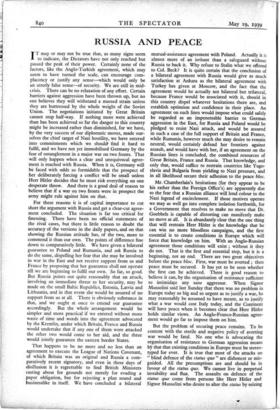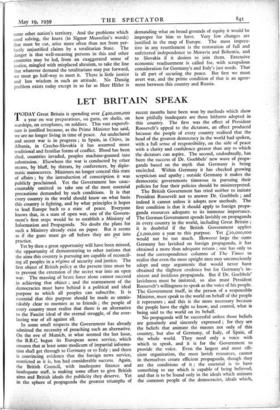RUSSIA AND PEACE
IT may or may not be true that, as many signs seem to indicate, the Dictators have not only reached but passed the peak of their power. Certainly none of the factors, like the Anglo-Turkish agreement, which may seem to have turned the scale, can encourage com- placency or justify any sense—which would only be an utterly false sense—of security. We are still in mid- crisis. There can be no relaxation of any effort. Certain barriers against aggression have been thrown up, but no one believes they will withstand a massed strain unless they are buttressed by the whole weight of the Soviet Union. The negotiations initiated by Great Britain cannot stop half-way. If nothing more were achieved than has been achieved so far the danger to this country might be increased rather than diminished, for we have, by the very success of our diplomatic moves, made our- selves the chief target of Nazi hostility, we have entered into commitments which we should- find it hard to fulfil, and we have not yet immobilised Germany by the fear of entanglement in a major war on two fronts. That will only happen when a clear and unequivocal agree- ment is reached with Russia. When it is, Germany will be faced with odds so formidable that the prospect of her deliberately forcing a conflict will be small unless Herr Hitler decides that he must risk everything on one desperate throw. And there is a good deal of reason to believe that if a war on two fronts were in prospect the army might rule against him on that.
For these reasons it is of capital importance to cut short the argument with Russia and get a clear-cut agree- ment concluded. The situation is far too critical for finessing. There have been no official statements of the rival cases, but there is little reason to doubt the accuracy of the versions in the daily papers, and on that showing the Russian attitude has, of the two, more to commend it than our own. The points of difference fine down to comparatively little. We have given a bilateral guarantee to Poland and Rumania, and ask Russia to do the same, dispelling her fear that she may be involved in war in the East and not receive support from us and France by proposing that her guarantee shall not operate till we are beginning to fulfil our own. So far, so good. But Russia points out quite reasonably that an attack, involving an immediate threat to her security, may be made on the small Baltic Republics, Estonia, Latvia and Lithuania, and in that event she would be assured of no support from us at all. There is obviously substance in that, and we ought at once to extend our guarantee accordingly. But the whole arrangement would be simpler and more practical if we entered without more waste of time and words into the agreement advocated by the Kremlin, under which Britain, France and Russia would undertake that if any one of them were attacked the other two would come to her aid, and the three would jointly guarantee the eastern border States.
That happens to be no more and no less than an agreement to execute the League of Nations Covenant, of which Britain was an original and Russia a com- paratively recent signatory, and even in these days of disillusion it is regrettable to find British Ministers casting about for grounds not merely for evading a paper obligation, but for rejecting a plan sound and businesslike in itself. We have concluded a bilateral mutual-assistance agreement with Poland. Actually it is almost more of an irritant than a safeguard without Russia to back it. Why refuse to Stalin what we offered to Col. Beck? It is quite certain that the conclusion of a bilateral agreement with Russia would give as much satisfaction at Ankara as the bilateral agreement with Turkey has given at Moscow, and the fact that the agreement would be actually not bilateral but trilateral, because France would be associated with it, should in this country dispel whatever hesitations there are, and establish optimism and confidence in their place. An agreement on such lines would impose what could safely be regarded as an impenetrable barrier to German aggression in the East, for Russia and Poland would be pledged to resist Nazi attack, and would be assured in such a case of the full support of Britain and France, while Rumania, however much she may desire to remain neutral, would certainly defend her frontiers against assault, and would have with her, if an agreement on the Russian lines is concluded, the combined resources of Great Britain, France and Russia. That knowledge, and only that, would suffice to restrain countries like Yugo- slavia and Bulgaria from yielding to Nazi pressure, and in all likelihood secure their adhesion to the peace bloc.
Mr. Chamberlain's hesitations (for they appear to be his rather than the Foreign Office's) are apparently due to the fear that a Russian alliance will lend colour to the Nazi legend of encirclement. If those motives operate we may as well go into complete isolation forthwith, for a Government that resolves to make no move that Dr. Goebbels is capable of distorting can manifestly make no move at all. It is abundantly clear that the one thing that will restrain Herr Hitler is the knowledge that he can win no more bloodless campaigns, and the first essential is to create conditions in Europe which will force that knowledge on him. With an Anglo-Russian agreement those conditions will exist ; without it they do not. That is the first and essential step, but it is a beginning, not an end. There are two great objectives before the peace bloc. First, war must be averted ; then peace must be secured. It has yet to be seen whether the first can be achieved. There is good reason to believe it can, by the organisation of resistance sufficient to intimidase any sane aggressor. When Signor Mussolini said last Sunday that there was no problem in Europe today so big and so urgent as to justify a war, he may reasonably be assumed to have meant, as to justify what a war would cost Italy today, and the Continent will have peace when it becomes clear that Herr Hitler holds similar views. An Anglo-Franco-Russian agree- ment would go far to impose them on him.
But the problem of securing peace remains. To be content with the sterile and negative policy of averting war would be fatal. No one who is advocating the organisation of resistance to German aggression means 13ST that that existing conditions in Europe must be stereo- typed for ever. It is true that most of the attacks on "blind defence of the status quo" are dishonest or mis- guided. All the presumptions are and should be in favour of the status quo. We cannot live in perpetual instability and flux. The assaults on defence of the status quo come from persons like Herr Hitler and Signor Mussolini who desire to alter the status by seizing some other nation's territory. And the problems which need solving, the knots (in Signor Mussolini's words) that must be cut, arise more often than not from per- fectly unjustified claims by a totalitarian State. The danger is that well-meaning persons in this and other countries may be led, from -an exaggerated sense of justice, mingled with misplaced altruism, to take the line that whatever demand the totalitarians may put forward, we must go half-way to meet it. There is little justice and less wisdom in such an attitude. No Danzig problem exists today except in so far as Herr Hitler is demanding what on broad grounds of equity it would be improper for him to have. Very few changes are justified in the map of Europe. The most impera- tive in any resettlement is the restoration of full and unfettered independence to Moravia and Bohemia, and to Slovakia if it desires to join them. Extensive economic readjustment is called for, with scrupulous consideration for Germany's and Italy's just needs. That is all part of securing the peace. But first we must avert war, and the prime condition of that is an agree- ment between this country and Russia.



















































 Previous page
Previous page